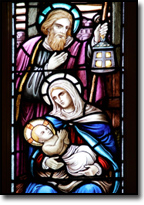Have Yourself a Merry Substantive Christmas
Have Yourself a Merry Substantive Christmas Rev. Tony Cooke
 OK, maybe it doesn’t have the flow of the song title, but I think it’s an important thought. Every year, countless voices decry the superficiality and materialism associated with Christmas. But what can we do to reclaim the richness and depth of this season? Being raised in a denominational church, I grew up hearing and singing many of the great hymns of the church, but I failed to recognize how rich many of them are in spiritual truth. At this time of year, I’m also reminded of how very powerful some of the great Christmas Carols are that have been written through the ages.
OK, maybe it doesn’t have the flow of the song title, but I think it’s an important thought. Every year, countless voices decry the superficiality and materialism associated with Christmas. But what can we do to reclaim the richness and depth of this season? Being raised in a denominational church, I grew up hearing and singing many of the great hymns of the church, but I failed to recognize how rich many of them are in spiritual truth. At this time of year, I’m also reminded of how very powerful some of the great Christmas Carols are that have been written through the ages.
Oh Holy Night
Before we can really esteem the value of the Good News, we need to understand just how bad the bad news really was. Before the significance and joy of Jesus’ birth can be fully appreciated, there must first be a realization of the world’s absolute hopelessness and despair if it had not been for the Savior who would come. “Oh Holy Night” (written in France in 1847) captures that sense of despair prior to Jesus’ arrival.
Long lay the world in sin and error pining. Till He appeared and the soul felt its worth.
I checked “pine” and “pining” in Noah Webster’s 1828 Dictionary, and it says these words imply, “languishing, wasting away, to bemoan in silence.” A more modern definition says that pining means, “to yearn intensely and persistently especially for something unattainable.” Humanity was lost, and we had no way of saving ourselves. Jesus did not come into a world that was having just a bit of trouble, or that merely needed some encouragement, motivation, or a better self-image.
Jesus came into a world that was “condemned already” (John 3:18), a world that was “sitting in darkness, in the shadow of death, and bound in affliction and irons” (Psalm 107:10; Matthew 4:16). Just how dark was it before Jesus came? Paul said in Ephesians 2:12 that we were “aliens from the commonwealth of Israel and strangers from the covenants of promise, having no hope and without God in the world.”
The Advent—the coming of Jesus—truly resulted in “the soul feeling its worth.” In spite of the sin and error that caused us to languish, God was saying to every human soul: “You are the object of my affection. I value you and have come to make you My Own.”
“Oh Holy Night” continues with, “His law is love and His gospel is peace. Chains shall he break, for the slave is our brother. And in his name all oppression shall cease.” Thank God for a substantive Christmas!
Oh come, Oh Come, Emmanuel
A Latin hymn from the 12th century also speaks to the bondage and oppression of the world—even of God’s covenant people—prior to Jesus’ coming: “Oh come, oh come, Emmanuel, and ransom captive Israel, that mourns in lonely exile here until the Son of God appear.”
Mourning in lonely exile? A captive people that needed ransoming? Is it possible that God’s people had really been kidnapped? Sin separates, and man needed far more than a good example or a teacher of morality; man needed a Redeemer. The hymn goes on to say:
O come, Thou Rod of Jesse, free
Thine own from Satan’s tyranny
From depths of Hell Thy people save
And give them victory o’er the grave
Someone wisely said:
If our greatest need had been information, God would have sent us an educator; If our greatest need had been technology, God would have sent us a scientist; If our greatest need had been money, God would have sent us an economist; If our greatest need had been pleasure, God would have sent us an entertainer; But our greatest need was forgiveness, so God sent us a Savior.
Hark, the Herald Angels Sing
In 1739, Charles Wesley wrote “Hark, the Herald Angels Sing.” I marvel at how succinctly and powerfully Wesley was able to weave so many weighty theological themes into this hymn (the virgin birth, the incarnation, the new birth, etc.). Some of the lyrics include:
Late in time behold Him come
Offspring of a Virgin’s womb
Veiled in flesh the Godhead see
Hail the incarnate Deity
Pleased as man with man to dwell
Jesus, our Emmanuel
Hail the heav’n-born Prince of Peace!
Hail the Son of Righteousness!
Light and life to all He brings
Ris’n with healing in His wings
Mild He lays His glory by
Born that man no more may die
Born to raise the sons of earth
Born to give them second birth
Earlier in the hymn, in the first verse, is one line that sums up the Gospel: God and sinners reconciled.
Even if this has been a really tough year for you… perhaps a year of great challenges, we pray that you have a Merry Substantive Christmas. We have been redeemed unto God, and we belong to Him. Satan’s tyranny no longer reigns over us, we no longer sit in the shadow of death, and because of Christmas, our soul does feel its worth.

